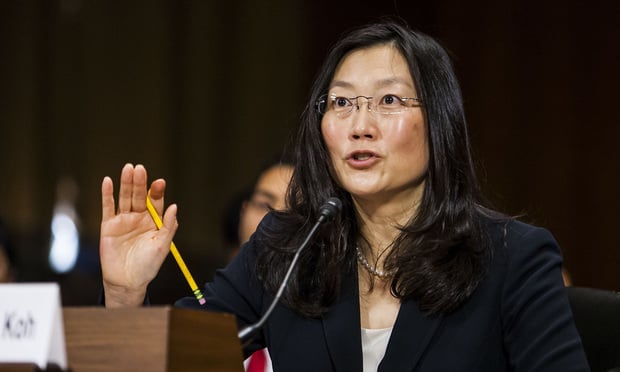Could Yahoo Breach Settlement Be the First Test of New Class Action Guidelines?
Lawyers have responded to U.S. District Judge Lucy Koh's questions in what could be the first test case for new class action settlement guidance in California's Northern District.
November 14, 2018 at 05:23 PM
5 minute read
 U.S. District Judge Lucy Koh. Photo by Diego Radzinschi
U.S. District Judge Lucy Koh. Photo by Diego Radzinschi
In what appears to be the first test case for the Northern District of California's new class settlement guidance, lawyers submitted new details about the $85M Yahoo data breach settlement in response to probing questions from a federal judge.
Following lawyers' court papers to approve last month's settlement, one of the largest for a data breach, U.S. District Judge Lucy Koh issued two orders for supplemental information that largely mimic the Northern District of California's new guidance for class action settlements, widely considered the strictest in the nation.
In a Nov. 9 response, some of which was sealed, lawyers filled up 21 pages answering Koh's nine questions, which included more information on the potential class recoveries had the case not settled and the lodestar, or the amount of hours billed by plaintiffs lawyers multiplied by their average hourly rates. Among other things, the guidance said lawyers should provide billing calculations in their fee request and estimate the recoveries had plaintiffs succeeded on their claims.
In their response, lawyers attached an exhibit detailing a lodestar of $22 million for 32 law firms, including Morgan & Morgan, New York's Milberg Tadler Phillips Grossman and Casey Gerry Schenk Francavilla Blatt & Penfield in San Diego. Yet information regarding how much the class could have gotten if the case had not settled was largely sealed.
“Disclosure of this information would reveal class counsels' work product and mental impressions of the case,” wrote plaintiffs' lawyer John Yanchunis in a declaration. “Protection of attorneys work product in the form of mental impressions is sacrosanct.”
Neither Yanchunis, of Morgan & Morgan in Tampa, Florida, nor defense attorney Ann Marie Mortimer of Hunton Andrews Kurth in Los Angeles, responded to requests for comment. The defendants are Altaba Inc., the division of Verizon formerly known as Yahoo, and Oath Holdings Inc., which owns Yahoo's holding company.
Koh plans to hear oral arguments on preliminary approval of the settlement at a Nov. 29 hearing.
In 2016, Yahoo announced that 500 million accounts had been hacked in 2014, compromising names, email addresses, phone numbers, birth dates and passwords. Months later, Yahoo disclosed another breach in 2013 that affected 1 billion accounts, a figure that Verizon increased to 3 billion last year. The settlement also involves a third breach in 2015 and 2016.
The deal is one of the largest data breach settlements in U.S. history. It resolves cases in multidistrict litigation before Koh, as well as those brought in California state court, later coordinated in Orange County Superior Court, and class actions brought in Israel.
The settlement includes a $50 million fund from which consumers can make claims for cash reimbursements of out-of-pocket costs, such as fraud charges and professional fees, associated with the breaches. In addition, Yahoo has agreed to provide at least two years of credit monitoring and identity theft protection insurance to class members, and implement enhancements to its security programs.
Lawyers filed a motion for preliminary approval on Oct. 22. Then, on Nov. 1, the Northern District of California published its new guidance on class action settlements.
On Nov. 2, Koh ordered the lawyers in the Yahoo settlement to provide more information. She also asked why the deal involved 200 million individuals with about 1 billion Yahoo accounts, when three breaches compromised more than 3 billion accounts. She also asked about how they selected the settlement administrator and the number of class members expected to submit claims—both aspects in the guidelines. In a Nov. 5 order, Koh asked more questions about the calculation of the plaintiffs' fee request and the use and retention of class member data provided in the settlement.
In their response, lawyers said they reached the 200 million figure by estimating that 80 percent of the U.S. population of adults living in the United States had Yahoo accounts during the class period. They noted that the number of accounts dropped after Koh dismissed claims by account users in foreign countries, except Israel. Not to mention, they wrote, many individuals had more than one account.
They estimated that between 1 percent and 3 percent of class members would submit claims, based on other breach cases. They also said that Yahoo is paying for and selected the settlement administrator, whose costs could be more than $5 million.
As to the class member data, lawyers said it would be “stored in a climate-controlled data center, with security cameras and restricted key access,” and transferred through a “secure web portal” and “encrypted file share.”
This content has been archived. It is available through our partners, LexisNexis® and Bloomberg Law.
To view this content, please continue to their sites.
Not a Lexis Subscriber?
Subscribe Now
Not a Bloomberg Law Subscriber?
Subscribe Now
NOT FOR REPRINT
© 2025 ALM Global, LLC, All Rights Reserved. Request academic re-use from www.copyright.com. All other uses, submit a request to [email protected]. For more information visit Asset & Logo Licensing.
You Might Like
View All
Morgan Lewis Shutters Shenzhen Office Less Than Two Years After Launch

Texas-Based Ferguson Braswell Expands in California With 6-Lawyer Team From Orange County Law Firm
2 minute read

Justin Baldoni Sues Blake Lively and Ryan Reynolds for $400M in New Step in 'It Ends With Us' Fight
6 minute readTrending Stories
- 1Bribery Case Against Former Lt. Gov. Brian Benjamin Is Dropped
- 2‘Extremely Disturbing’: AI Firms Face Class Action by ‘Taskers’ Exposed to Traumatic Content
- 3State Appeals Court Revives BraunHagey Lawsuit Alleging $4.2M Unlawful Wire to China
- 4Invoking Trump, AG Bonta Reminds Lawyers of Duties to Noncitizens in Plea Dealing
- 522-Count Indictment Is Just the Start of SCOTUSBlog Atty's Legal Problems, Experts Say
Who Got The Work
J. Brugh Lower of Gibbons has entered an appearance for industrial equipment supplier Devco Corporation in a pending trademark infringement lawsuit. The suit, accusing the defendant of selling knock-off Graco products, was filed Dec. 18 in New Jersey District Court by Rivkin Radler on behalf of Graco Inc. and Graco Minnesota. The case, assigned to U.S. District Judge Zahid N. Quraishi, is 3:24-cv-11294, Graco Inc. et al v. Devco Corporation.
Who Got The Work
Rebecca Maller-Stein and Kent A. Yalowitz of Arnold & Porter Kaye Scholer have entered their appearances for Hanaco Venture Capital and its executives, Lior Prosor and David Frankel, in a pending securities lawsuit. The action, filed on Dec. 24 in New York Southern District Court by Zell, Aron & Co. on behalf of Goldeneye Advisors, accuses the defendants of negligently and fraudulently managing the plaintiff's $1 million investment. The case, assigned to U.S. District Judge Vernon S. Broderick, is 1:24-cv-09918, Goldeneye Advisors, LLC v. Hanaco Venture Capital, Ltd. et al.
Who Got The Work
Attorneys from A&O Shearman has stepped in as defense counsel for Toronto-Dominion Bank and other defendants in a pending securities class action. The suit, filed Dec. 11 in New York Southern District Court by Bleichmar Fonti & Auld, accuses the defendants of concealing the bank's 'pervasive' deficiencies in regards to its compliance with the Bank Secrecy Act and the quality of its anti-money laundering controls. The case, assigned to U.S. District Judge Arun Subramanian, is 1:24-cv-09445, Gonzalez v. The Toronto-Dominion Bank et al.
Who Got The Work
Crown Castle International, a Pennsylvania company providing shared communications infrastructure, has turned to Luke D. Wolf of Gordon Rees Scully Mansukhani to fend off a pending breach-of-contract lawsuit. The court action, filed Nov. 25 in Michigan Eastern District Court by Hooper Hathaway PC on behalf of The Town Residences LLC, accuses Crown Castle of failing to transfer approximately $30,000 in utility payments from T-Mobile in breach of a roof-top lease and assignment agreement. The case, assigned to U.S. District Judge Susan K. Declercq, is 2:24-cv-13131, The Town Residences LLC v. T-Mobile US, Inc. et al.
Who Got The Work
Wilfred P. Coronato and Daniel M. Schwartz of McCarter & English have stepped in as defense counsel to Electrolux Home Products Inc. in a pending product liability lawsuit. The court action, filed Nov. 26 in New York Eastern District Court by Poulos Lopiccolo PC and Nagel Rice LLP on behalf of David Stern, alleges that the defendant's refrigerators’ drawers and shelving repeatedly break and fall apart within months after purchase. The case, assigned to U.S. District Judge Joan M. Azrack, is 2:24-cv-08204, Stern v. Electrolux Home Products, Inc.
Featured Firms
Law Offices of Gary Martin Hays & Associates, P.C.
(470) 294-1674
Law Offices of Mark E. Salomone
(857) 444-6468
Smith & Hassler
(713) 739-1250






